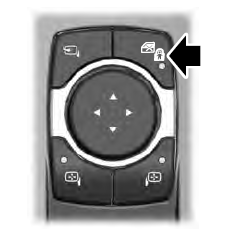Lincoln Aviator: MyKey™ / Creating a MyKey. Clearing All MyKeys
Creating a MyKey
Use the touchscreen to create a MyKey:
- Insert the key you want to program into the ignition. If your vehicle has a push-button start, place the remote control into the backup slot.
- Switch the ignition on.
- Access the main menu in the touchscreen and then scroll through the menus to change the settings of your MyKey. From the MyKey menu, select the option Create MyKey.
- Press Yes if you want to create the key as a MyKey. A confirmation message appears on the screen.
- Switch the ignition off.
You have successfully created a MyKey. Make sure you label it so you can distinguish it from the admin keys.
You can also program configurable settings for the key.
Programming and Changing Configurable Settings
Use the touchscreen to access your configurable MyKey settings.
- Switch the ignition on using an admin key or the remote control you want to program.
- Access the main menu in the information display and then scroll through the menus to change the settings of your MyKey.
- Follow the instructions in the touchscreen.
The programmed restrictions apply when you switch the vehicle off, open and close the driver door and restart your vehicle with the programmed key or remote control.
Note: You can clear or change your MyKey settings at any time during the same key cycle as you created the MyKey. Once you have switched the vehicle off, however, you need an admin key to change or clear your MyKey settings. When you make any changes to your MyKey settings, you change the settings for every MyKey. You cannot make individual changes to apply to specific MyKeys.
Clearing All MyKeys
When you clear your MyKeys, you remove all restrictions and return all MyKeys to their original admin key status at once. To clear all MyKeys of all MyKey settings, use the touchscreen.
- Switch the ignition on using an admin key.
- Access the main menu in the touchscreen and then scroll through the menus to begin clearing your MyKey programming.
- Follow the instructions in the display.
- A confirmation message appears in the display after you finish clearing your MyKeys.
Note: When you clear your MyKeys, you remove all restrictions and return all MyKeys to their original admin key status. You cannot remove the MyKey restrictions individually
 Optional Settings
Optional Settings
You can configure certain vehicle feature
settings when you first create a MyKey. You
can also change the settings afterward with
an admin key...
 Checking MyKey System Status and Using MyKey With Remote Start Systems
Checking MyKey System Status and Using MyKey With Remote Start Systems
Checking MyKey System Status
You can find information about your
programmed MyKeys by using the
touchscreen.
MyKey Distance
Tracks the distance when drivers use a
MyKey...
Other information:
Lincoln Aviator 2020-2026 Service Manual: Removal and Installation - Front Fog Lamp
Removal NOTE: Removal steps in this procedure may contain installation details. NOTE: LH side shown, RH side similar. Remove the front bumper cover. Refer to: Front Bumper Cover (501-19 Bumpers, Removal and Installation). Disconnect the electrical connector, remove the screws and the front fog lamp assembly...
Lincoln Aviator 2020-2026 Service Manual: Removal and Installation - Glove Compartment
Special Tool(s) / General Equipment Interior Trim Remover Removal NOTE: Removal steps in this procedure may contain installation details. Release the clips and remove the finish panel. Use the General Equipment: Interior Trim Remover Release the clips and remove the switch...
Categories
- Manuals Home
- Lincoln Aviator Owners Manual
- Lincoln Aviator Service Manual
- Fuel Quality
- Keyless Entry
- Changing the Front Wiper Blades - Vehicles With: Heated Wiper Blades
- New on site
- Most important about car
Child Safety Locks
When the child safety locks are set, you cannot open the rear doors from the inside.

The child safety lock control is on the driver door.
Press the control to switch the child safety locks on. Press the control again to switch them off. A light on the child safety control illuminates when you switch them on.
